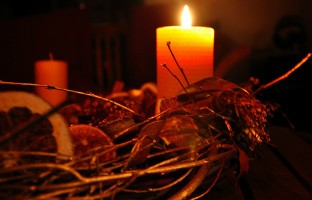Why I need Advent
Come to the river, wash away your sins, start a new life. Now—because something is coming.
On spiritual retreats I often hear people say they love Advent more than Christmas. This does not surprise me, since Christians tend to set apart this season to grow, strengthen and explore the boundaries of the soul.
But I wonder—has the Christian culture lost Advent? Advent’s call to simplicity, poverty of spirit, and conversion makes Christmas wondrous and, finally, comprehensible. But is the problem as simple as putting up the tree too soon?
I know I’m a curmudgeon about this. When I was a child, no one in our neighborhood put up a tree before Christmas Eve. Childhood anticipation is Christmas’s greatest gift. And there was time! Time to mature in years and in spirit. My parents rejected religion, but they created an atmosphere that allowed their children to enjoy it.





